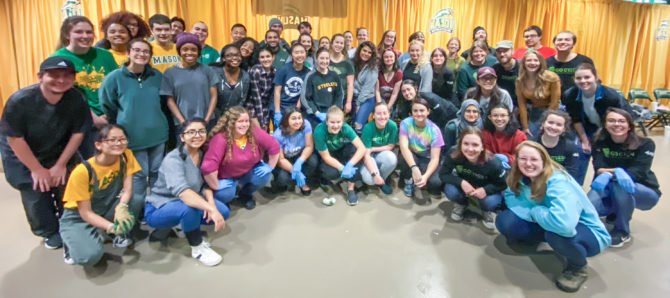
Learn about sustainability and make an impact at George Mason University in our year-long* residential experience on the Fairfax Campus hosted by the College of Science!
You’ll learn how to make Mason more sustainable while also improving your day-to-day sustainability, all while living with like-minded folks in the Eastern Shore Residence Hall!
Plus, the Environment and Sustainability Learning Community is open to students of all majors, minors, and areas of study. You don’t need any prior knowledge or expertise, just passion and curiosity!
* many students spend a semester at the Smithsonian Mason School of Conservation or study abroad with the Global Education Office for a semester – this is okay and you can still be a member of the Environment and Sustainability Learning Community!
In the Environment and Sustainability Learning Community, you’ll also
- Establish friendships and build community
- Learn about the core concepts of sustainability and opportunities to make an impact at Mason
- Network and create connections with sustainability change agents at the university
- Enhance your skills so you’re career-ready
- Receive support from dedicated student staff, faculty instructors, and staff support members
What is a Learning Community (LC)?
A Learning Community (LC) is a group of students living on campus who share a common academic college, identity, or interest!
When living in an LC, students will join like-minded peers to explore their passion areas on a deeper level, to connect to vital campus resources, and to grow both in and out of the classroom. Students in the same learning communities live together in a residence hall, which makes it easier to make connections within the Mason community.
All first-year residential students will belong to an LC. LCs are also offered to upper-level residential students, but upper-level students are not required to join one.
Benefits of a LC include:
- A supportive, educational, and exciting experience with a community of peers
- A team of dedicated staff that ensures a positive and supportive student experience
- Fun, engaging activities that focus on the interest of students’ specific community
- Opportunities to connect with other students
Access to academic resources and support from tutors, campus resources, and faculty - Interaction with like-minded individuals so that students can engage their passions and learn outside of the classroom
- Mentoring from upper-level students who have experience in the LC topic
- Events and programs tailored to the LC by content experts connected to that LC
Eligibility
Residential Requirements
- The Environment and Sustainability Learning Community experience is open to all multi-year (non-Freshman) undergraduate students who are planning to live on campus. Please note, if you are accepted to the Environment and Sustainability Learning Community, you will be required to live on campus in the Eastern Shore residence hall.
Major/Minor or Degree Requirements
- Students enrolled in ALL degree programs, majors, and minors are eligible to join the community!
Course Requirements
- All students participating in the Environment and Sustainability Learning Community are required* to enroll in one course per semester.
- *scheduling conflicts with courses required for graduation or other reasonable reasons a student might not be able to enroll in a course (such as financial challenges) are considered on a case-by-case basis.
- The courses for 2022-23 academic year will be hosted and taught by College of Science faculty members.
Application
The application opens on December 13, 2021, on Housing and Residence Life’s Housing Portal.
Hurry to apply – the deadline is February 1, 2022.
Questions, Comments, Concerns?
The Learning Communities’ Frequently Asked Questions (FAQs) page has answers for you! The official website for the Learning Communities is also a great resource.
For any additional questions related to Learning Communities, please contact masonlc@gmu.edu.
